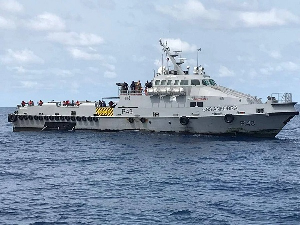 When Ghanaians go to the polls on Thursday, they will mark the end of an era: nearly two decades of uninterrupted rule by Jerry John ("JJ") Rawlings, one of Africa's most colorful leaders.
When Ghanaians go to the polls on Thursday, they will mark the end of an era: nearly two decades of uninterrupted rule by Jerry John ("JJ") Rawlings, one of Africa's most colorful leaders.
The man who won over the country when as a dashing young flight lieutenant he seized power in a 1981 coup, then legitimized his rule through democratic elections in 1992, must now take a constitutional exit after 19 years at the helm.
Rawlings will remain life chairman of the party he formed, the National Democratic Congress (NDC), after passing the baton to his vice president of four years, John Atta Mills, who faces a stiff challenge from the main opposition candidate, John Kufuor of the New Patriotic Party, in Thursday's elections.
Born in Accra in 1947 of a Ghanaian mother from the Ewe tribe and a Scotsman who abandoned her, Rawlings joined the air force as a cadet at the age of 20.
He graduated from Accra's military academy in 1969, having won the "Speed Bird Trophy" for his flying and airmanship.
By 1978 he had risen to the rank of flight lieutenant.
Enraged at the steady impoverishment of his country -- which in the early 20th century was Africa's most prosperous colony thanks to its wealth of cocoa, gold and timber -- Rawlings blamed the generals who had taken over Ghanaian politics since independence leader Kwame Nkrumah was overthrown in 1966.
In May 1979, Rawlings led an abortive mutiny of junior officers. At his court martial hearing the flight lieutenant, a gifted speaker, began his seduction of the Ghanaian public by opting to mount his own defense.
The upstart was set free from prison by other officers, and in June 1979, Rawlings and company overthrew the ruling Supreme Military Council in a widely popular coup.
Showing himself to be as ruthless as his predecessors, he had eight generals, including three former military rulers, Akwasi Afrifa, Ignatius Acheampong and Frederich Akuffo, shot by firing squad, and established the Armed Forces Revolutionary Council.
Rawlings led the council as Ghana's temporary head of state from June to September 1979 when he ceded power to an elected civilian regime led by northern conservative Hilla Limann.
This government lasted until JJ's second successful coup, which he staged on New Year's Eve, 1981.
Rawlings scrapped the constitution, abolished political parties and dissolved parliament, calling the coup "an exercise in exorcism that helped to deflate the anger of a people who felt betrayed."
Over the next two years Ghana's economy nose-dived and its human rights record deteriorated under Rawlings' socialist Provisional National Defence Council, prompting the Bretton Woods institutions to make a firm stand for reforms.
Rawlings signed on to a structural adjustment program, setting off a new wave of brutality as diehard leftists in the PNDC, accusing him of betraying the socialist cause, were foiled in a series of coup attempts.
In 1992, under domestic and international pressure and mindful of Ghana's dependence on overseas aid, Rawlings, now retired from the military, held and won a presidential poll, riding on his lasting image as a man of the people.
Opposition parties complained the vote was rigged and boycotted a parliamentary poll held later the same year, thus handing the Rawlings-led National Democratic Congress a huge majority.
Four years on, the legitimized Rawlings stands ready to become an African statesman to be remembered more as an icon of democracy than a ruthless strongman.
Rawlings is married to the politically prominent Nana Konedu, has four children and still likes to fly.
General News of Tuesday, 26 December 2000
Source: AFP












